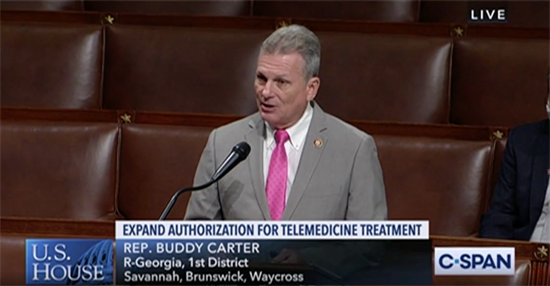Press Releases
House Unanimously Approves Carter Bill to Improve and Increase Access to Telemedicine for Veterans
Washington,
September 23, 2020
The U.S. House of Representatives today approved legislation introduced by Congressman Earl L. "Buddy" Carter (R-Ga.) to improve and increase access to telemedicine for veterans.
The VA Mission Act, signed into law in June 2018, reformed a wide range of veteran health care issues, but the telemedicine portion of the law includes an error that prohibits trainees from using the telemedicine system. These trainees are typically interns, residents, fellows, or graduate students who are working with the Department of Veterans Affairs (VA) to gain necessary experience to become doctors and/or work full-time with the VA. Without this necessary experience, these individuals will not be getting important training in this area and may use the system for the first-time only when they become a licensed doctor, creating a delay in training and the potential for more mistakes. Carter's legislation, the VA Mission Telemedicine Clarification Act, ensures trainees who are satisfying professional training program requirements are able to use the telemedicine system. These trainees will be required to be supervised by an appropriately credentialed VA staff member. Carter spoke on the House floor about the legislation ahead of passage today. Click hereto view or download Carter's floor speech. On the floor, Carter said, "I rise today in support of the VA Mission Telehealth Clarification Act, which I am proud to have introduced. H.R. 3228, the VA MISSION Telehealth Clarification Act, is a simple bill that builds on the VA Mission Act’s historic expansion of the veterans’ health system. One of the most significant parts of the VA Mission Act was the authorization for the VA to use telehealth and provide care across state lines. The bill began as the result of a visit to the VA facility before the current pandemic, as they laid out some of the issues they were trying to overcome. But now with the COVID-19 pandemic, we are seeing how extremely beneficial these technologies can be for our veterans. In fact, the VA Medical Center in Charleston, SC, which serves part of my district along Georgia’s coast, had an over 200% increase in telehealth medical services during the pandemic when we spoke this May. Even more incredibly, the VA announced it had a 1000% increase in telehealth video appointments using its VA Video Connect Program during the first months of the pandemic. This is an extremely important ability for the VA to have, however, the law did not authorize trainees within the VA to use telehealth technologies — only practitioners with a full license. As telehealth medicine grows in prevalence, we need for interns, residents, and fellows to gain experience using these services. Especially considering that many of these trainees later go on to work as doctors at the VA, bringing with them a wealth of experience. Rather than depending on doctors to learn while on the job, which could delay the rollout of care, this bill would allow trainees to gain experience on telehealth systems while properly supervised by credentialed VA staff. I am pleased to say that the bill was further improved through the committee process after input from my colleagues and the VA. The bill will not only allow for trainees to participate in telehealth, but also expands the ability to practice telemedicine to all appropriately qualified health care professionals at VA— fixing this issue once and for all. While Congress intended for trainees and others to be included from the beginning, the VA’s reading of the law did not include them, although they have expressed their desire to include them in telehealth services. The VA Mission Telehealth Clarification Act will give VA the certainty to provide essential telehealth programs to our veterans, improving the quality and timeliness of their care. Again, this is a commonsense bill with bipartisan support, and has received support from The American Legion, Veterans of Foreign Wars, AMVETS, and Paralyzed Veterans of America, among others." |


